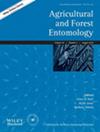The relevance of integrating multiple sensory modalities into capturing devices: The case of the global pest Sirex noctilio
IF 1.8
3区 农林科学
Q2 ENTOMOLOGY
引用次数: 0
Abstract


将多种感官模式整合到捕捉装置中的意义:全球害虫 Sirex noctilio 的案例
Sirex noctilio 是一种入侵性森林胡蜂,影响全球许多地区的松树,可造成严重的经济损失。目前监测这种害虫的诱捕方法主要依赖非特异性半化学物质。这种缺乏特异性的方法可能会导致低吸引/捕获水平,这是不可取的,尤其是当目的是在害虫种群密度较低时发现害虫。在这种情况下,一个有趣的机会出现了,那就是通过结合视觉线索来提高诱捕器的灵敏度。为此,我们对视觉信息的潜在来源进行了评估,根据物种生态学,这些视觉信息可以引起与嗅觉线索互补的吸引反应。我们测量了松树树皮、绿针叶和木蠹蛾雄虫腹部的反射光谱。然后将光谱与 120 种商业油漆颜色进行比较,这些颜色将应用于板式诱捕器上。在两个飞行季节,我们结合挥发性诱饵(松节油)和不同颜色的诱捕器进行了 155 个诱捕器的现场实验。我们观察到,与黑色对照诱捕器相比,松树皮色诱捕器的捕获量明显更高。我们的研究结果令人鼓舞,因为它们表明将视觉和化学信息结合起来进行可持续害虫生物监测是有潜力的。
本文章由计算机程序翻译,如有差异,请以英文原文为准。
求助全文
约1分钟内获得全文
求助全文
来源期刊

Agricultural and Forest Entomology
农林科学-昆虫学
CiteScore
3.60
自引率
6.20%
发文量
66
审稿时长
>24 weeks
期刊介绍:
Agricultural and Forest Entomology provides a multi-disciplinary and international forum in which researchers can present their work on all aspects of agricultural and forest entomology to other researchers, policy makers and professionals.
The Journal welcomes primary research papers, reviews and short communications on entomological research relevant to the control of insect and other arthropod pests. We invite high quality original research papers on the biology, population dynamics, impact and management of pests of the full range of forest, agricultural and horticultural crops.
 求助内容:
求助内容: 应助结果提醒方式:
应助结果提醒方式:


